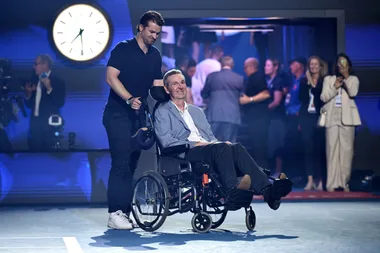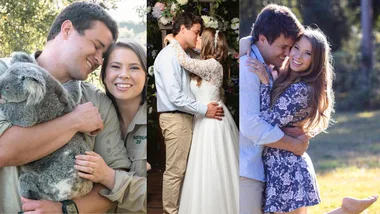When Emma Carey describes the most beautiful town in the world, she says it looks like a dollhouse and then an oil painting, because in her memory, it’s falling away from her as she rises above it in a helicopter. Her 2013 trip to Lauterbrunnen, in Switzerland, was part of a long-held dream she and Jemma Mrdak had shared for as long as they could remember. Best friends since grade one, Emma was drawn to Jemma because she was fearless. But on this summer’s day in June, it was Emma’s appetite for adrenaline that had brought them into the chopper for a skydiving experience, and as they flew skyward, Jemma’s eyes were brimming with tears.
It wasn’t unreasonable for Jemma to be scared – they were about to hurtle into the air at 14,000 feet – but Emma, then 20, was excited and had a huge smile on her face. An active, sporty and irrepressibly positive young woman, she loved to throw herself into new experiences, and on that fateful day, she was eager and unafraid. Emma and her skydiving instructor sat on the edge of the helicopter, then they leapt, and suddenly they were flying, floating, weightless in the sky. Emma was euphoric. These were the experiences she lived for.
The instructor tapped her shoulder to let her know he was about to deploy the parachute. When the jolt came it was painful. “It felt like my hair was being ripped from my head. Nobody had warned me that it would hurt,” Emma recalled in her memoir The Girl Who Fell From The Sky. Something was wrong. “As we continued to plummet a sudden terror ripped through me.” The chute had failed. She could see it whipping in the air. “Red like a warning.” It was a 4.2-kilometre drop, and they were no longer flying, they were falling fast. An unthinkable realisation hit Emma: She was about to die.
Her mind filled with all the things she’d never get to do, the people she’d never see again. “My desire to live pounded through my veins with increasing urgency. How was this happening? I wasn’t ready for this yet. I wanted to live.” As she hurtled towards the earth, all she could feel was fear. The ground was coming closer. Impact was imminent. Her dream had become a nightmare. Skydiving with her best friend was the last thing she’d ever do.
Jemma and Emma share that rare type of lifelong friendship that grows stronger over time. It started in a grade one class in Canberra. Emma was given the seat next to Jemma. “I think we became friends because our names rhymed,” says Jemma. She remembers thinking: “Emma! You have the same sort of name as me. Let’s be friends!” Emma remembers that it was an early caper that bonded them. “I was super, super shy and quiet and just scared of everyone and Jemma was not,” Emma laughs. “I was scared of her because she was so confident. Then one day we had to do this activity in our books and Jemma asked if we could swap books. Then we had to show our work to the teacher and then I got a sticker for what I did and Jemma didn’t and she was upset, but I said, ‘No, it’s okay, you did get a sticker’. She forgot that I had her book, and after that, we were friends.”

Growing up together in Canberra, they were inseparable. As kids, they rarely ventured beyond their familiar cluster of south-side suburbs, but in their teenage years they both developed a desire to explore. At 18, they took a cruise together. They loved it and planned a grander adventure. When they reached their twenties, it was time. Emma says the trip came at a crossroads in her life. She’d been studying nutrition at university but deferred her course because she wasn’t passionate about it. “I think I was feeling a bit lost. All the jobs I was doing at the time were just to save for this trip,” she says. “The only thing I knew for sure was that I wanted to travel. I put all my hopes for the future into that trip because I didn’t know what came after that. There was a lot riding on it – just to find my place in the world a little bit.”
They touched down in London and hit up Oxford Street. Emma sat at the foot of the Victoria Memorial in front of Buckingham Palace and sketched. She’d always had a creative streak. Then it was on to Paris, where they lay on the grass and looked up at the Eiffel Tower. Their dreams took them to Switzerland and the magical mountain town of Lauterbrunnen. The next destination on their list was Italy, but there was one thing Emma wanted to do first – skydiving – and this hamlet nestled in the alps felt like the perfect place. All it took was one second for everything to veer shockingly off track.
Jemma plunged out of the helicopter immediately after Emma and had no idea anything was wrong. Her feet found the ground lightly, and as she connected with the firm, safe field, she felt relief. She wouldn’t be going skydiving again. She was glad it was over but any positive feelings she had quickly vanished when she heard Emma shouting her name. She looked over and saw her best friend lying on the ground, screaming, with blood on her face. Jemma bolted towards her. “I had to very quickly think of how to action things. How to handle what was going on,” Jemma says. Miraculously, Emma not only survived the fall, she remained conscious the entire time. One minute she was plummeting, the next she was panting, tasting blood and reeling from the most unimaginable “gut-wrenching, unbearable, straight-to-your-core pain”. She was alive, but she was in agony.
“It enveloped me and with every second it grew worse.” When she tried to roll over, she discovered she was unable to move her legs. Jemma, frantic, begged a couple walking by for their phone so her Swiss-speaking instructor could call emergency services for Emma and her instructor, who had also survived. Then she dropped down onto the ground beside her cherished friend and waited. “You can’t really prepare for things like that,” Jemma says. People have asked her, ‘How did you know to do this? How did you know to do that?’ “It was instinct to step in and be by her side and call for help and do what I could to make sure she was okay.” Paramedics arrived and immediately called for a helicopter. Emma was airlifted to a hospital in Bern, with Jemma by her side. In that moment, Emma was aware that just because she’d survived the fall, her future and her life were not assured. Her doctors later told her Jemma was the only person without an injury ever to talk themselves onto the rescue chopper.

As the chopper rushed her to Bern, and Emma struggled to process her new reality, she looked at Jemma and at the same moment they pulled a silly face. “We did it simultaneously, without saying a word, and we both laughed,” Emma says. “Back then we were so young. I’d never really been in a situation where I’d experienced such polarising things at the same time. But, as you get older you realise that it’s possible that you can experience heartbreak and joy and grief and all those things at once.” At the hospital, Jemma refused to leave Emma’s side. She used a nearby hotel as her base but spent the nights sleeping on the floor next to Emma’s bed. Emma’s family rushed to be with her as soon as possible, but there were a few days when they only had each other.
“That was the hardest time for me because Emma had multiple surgeries and was under a lot of medication,” Jemma says. “I just thought I need to do as much as I can to support Emma. I didn’t leave her side for that time. It was really one of the toughest things I’ve ever had to experience. You don’t go on a trip with your best friend expecting this to happen. I put my focus onto Emma. How can I help? How can I continue to be a good best friend?” Emma would remain in hospital in Bern for a month. She had broken her sacrum, her sternum and the L1 vertebra. Her spinal cord had been crushed and her pelvis was broken. Her Swiss doctor told her that she would never move her legs again. This new reality was crushing.
People would tell her she was brave and strong, but she says she was just getting through each day as best she could. In those early weeks, that spark of optimism that is one of her defining characteristics began to wane. “No matter what I did, even if it was just to lie in bed all day and give up, mentally, still people viewed that as strong because after you’ve faced something like that, people will view you literally just breathing as strong. You get labelled as these things but really you don’t have much say in it. You’re just doing what you need to do,” she says.
The first weeks of recovery were a dark time for Emma, and she experienced despair like she’d never known. But it’s not in her nature to dwell on the negative and she began to see hope and gratitude in the smallest of places. The devotion of her best friend, and the kindness of her nurses fed her spirit. She reflected on the simple things she’d taken for granted and she wrote down five little words in her phone’s notes app that would guide her through her recovery and beyond: “If you can, you must.” When Emma was strong enough, she began rehabilitation. Step by painful step, she edged closer to her goal. Just standing left her feeling sweaty and faint like she used to after running 10 kilometres.


“It was excruciating but I pushed through the pain because what the heck! I was standing,” she recalls. When she was strong enough, Emma returned to Sydney to continue her rehabilitation. Her recovery was a full-time job. She regained the ability to walk, but the process was gruelling, and plagued by setbacks. She did what she could to help herself heal and create a new life. She relocated to the Gold Coast. She became a doting aunty. She painted a mural at Bondi Beach. Drawing and writing were a big part of her recovery. When the first anniversary of her fall arrived, she looked back at everything that had happened, and all that she’d survived, and began to think of that fateful date as her re-birthday. “It’s like just choosing to have two birthdays. It’s arrogant in a way,” she laughs. “That’s one day of the year where I do actively think about it all and I let myself feel, not necessarily upset, but feel emotions I don’t normally stop to think about throughout the year.”
In time, she began putting her feelings into words, telling the story that would become the bestselling book, The Girl Who Fell From The Sky. “Writing a book was a huge dream of mine. I never imagined I’d write a memoir. I always imagined it would be fiction,” she laughs. But hitting the milestone and getting those words and experiences down on the page meant the world to her. “I always felt really – dumb is not the word – but everyone was going off and having these careers and I just felt so young and stumped that I never got to do all of those things,” Emma says. “I felt so proud of myself that I finished something, that I did something. I tried it and I finished it and I got to do an adult, grown-up thing. I know that sounds so weird, but I’d never had that experience before … It was just nice to feel accomplished in that way.”
Emma’s story was embraced by readers around the world, and as Jemma joined the book tour last year, they both contemplated the fact that they were coming up to the 10-year anniversary of the day Emma fell from the sky. “And we were like: Imagine if we just went back! There was no more discussion than, ‘Let’s go! Let’s have fun this time. Let’s create some really positive memories’,” says Jemma. “I think we always just thought we would,” Emma adds.
In June this year, they boarded a flight to Europe and retraced their steps, stopping in Paris and then visiting Lauterbrunnen. They captured videos of the joyous return – the laughter and the elation of being alive. They visited the hospital in Bern, and the courtyard where Emma had been wheeled out to feel the sun on her face while she was bed-bound. It was the fulfilment of their long-held dreams, but it wasn’t without its confronting moments. “Someone mentioned that the body remembers what the mind forgets,” Jemma says. “We went to the [hospital] cafeteria and had lunch. We were eating and I just started crying. It was the weirdest thing because I didn’t know why I was crying. Nothing that was happening was upsetting me. My body just started to release emotions.”


Jemma carries a lot of survivor guilt, and returning to Switzerland brought it bubbling to the surface. “I’ve learnt that’s a normal thing to have when you’ve had someone you love go through something, but it didn’t happen to you, and you wonder why. Why wasn’t it me and why did it have to happen to Emma? Physically, being back there just brought back all of these emotions that I hadn’t processed. That was a pivotal moment for me.” They also returned to the field. “We were able to share our different experiences with each other,” Jemma says. “Emma and I have never really spoken about the nitty-gritty details. It was nice to walk through it in real time and share that with one another.” “We were trying to, I guess, think of how far we’ve come and think of how different things were and how much things can change in 10 years, and just be in our feelings,” Emma explains.
Then it was on to Italy, 10 years after they had first planned to visit. Though they had moments of reflection and gratitude, the true purpose of this second trip was to celebrate their good fortune and the bond that they share. “At the end of the day, we’re just two best friends wanting to share fun experiences with each other,” Jemma concludes. “I think that trip cemented our friendship even further.” Emma agrees wholeheartedly. “When I was 20, the only thing I knew I wanted was to see the world,” she says. “My life has been filled with experiences that I’d have felt lucky to have anyway, but everything’s doubled because I know I could easily not be here to experience any of it. So, anything I get to experience after the accident, I’m just like, ‘Wow how lucky am I?’”










